|
 |



2007 - Kevin Kline

Richard Rodgers Theatre - New-York
Si je choisis d'angliciser la particule de notre cher héros français c'est que ce spectacle New-Yorkais, sans mettre à mal la pièce de Rostand, lui distille un parfum très américain au travers de détails que certains n'auront peut-être pas relevé, mais qui indéniablement montrent que cette mise en scène est faite pour Broadway.
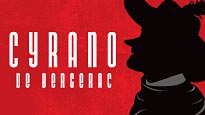 |

1ère représentation : 12 octobre 2007.
|
 |
Pour illustrer mon propos j'évoquerai deux éléments. Tout d'abord le décor. On pourrait croire que nous sommes à Broadway, donc finalement pas très loin de Hollywood (surtout avec la distribution proposée), et que de ce fait de grands moyens ont été sollicités pour faire de chaque acte un tableau richement illustré. Il n'en n'est rien. Les décors sont plutôt sobres, avec un fond de scène qui reste identique tout au long de la pièce : un gigantesque mur de briques sombres, avec un escalier à paliers, descendant du haut, côté jardin, au bas, côté cour. Escalier par lequel arrivent, repartent, les comédiens, et sur lequel certains déclament leur texte (en anglais, cela va de soit, selon la traduction d'Anthony Burgess). Bref ce gigantesque mur de brique, avec cet escalier avaient des airs d'arrière cour de building new-yorkais ancien : premier exemple. Avant de divulguer ma seconde illustration, je termine sur le décor. Le fond reste donc identique, ce ne sont que quelques éléments centraux de la scène qui donne la situation de l'acte. Notamment un arbre mort, tantôt debout (scène du balcon), tantôt couché comme abattu (Arras), tantôt penché (curieusement), au dernier acte. A noter un très bel effet pour la scène du balcon : Un rideau blanc descend du plafond au sol, avec suspendu, au milieu, devant, le balcon, qui semble flotter dans les airs : très réussi. Autre réussite : les feuilles mortes rouges, contrastant avec le décor sombre qui tombent lascivement lors du dernier acte. Second « américanisme » : il faut bien que tout finisse à peu près bien, et donc, chose que je n'avais jamais vue dans aucune adaptation, alors que le pot aux roses est découvert, que Cyrano déclame ses dernières tirades, Roxane l'enlace et l'embrasse. Mais finalement, c'est vrai on est heureux. Enfin Cyrano a eu ce baiser tant désiré? Si vous percevez quelque peu d'ironie dans cette première partie, c'est normal, mais ceci étant dit, c'est globalement une belle adaptation. Kevin Kline compose un Cyrano flegmatique, assez réussi, mais tout de même très calme, ce qui pourrait en étonner plus d'un quand on sait que Cyrano achèvera la pièce sur le mot Panache. Et pourtant on est séduit par ce parti pris. Jennifer Garner est une des meilleures Roxane que j'ai vues : impertinente, insolente, prêtant main forte (brièvement) à Cyrano lors de son duel avec Valvert. On pouvait avoir peur qu'elle aille trop loin (l'héroïne d'Alias passe habituellement son temps à se battre et à multiplier les prouesses physiques), elle montre ici qu'elle peut être sensible et laisser de côté son trop plein d'énergie, pour aller dans une partition plus pausée. Seul Christian est à mon sens raté. Il est présenté comme un personnage caricatural, profiteur, écervelé, on est loin de l'interprétation en finesse d'un Vincent Perez (mais c'était du cinéma?). Christian mérite mieux. C'est tout de même lui qui dit à Cyrano qu'il n'a pas le droit de lui voler son bonheur?et c'est encore lui qui lui « jette » tous ces nez à la figure? Le personnage est donc loin d'être un jeune irréfléchi tout feu tout flamme. Mention spéciale à l'interprète de Le Bret (John Douglas Thompson), qui joue un parfait confident, et dont la voix grave est impressionnante. La mise en scène de David Leveaux est alerte et très mouvementée. Elle propose une vraie fluidité entre chaque scène, et les enchaînements se font très rapidement (pas de temps mort). Pourtant au final il manque un je-ne-sais-quoi d'émotion qui pourrait définitivement faire chavirer le public. L'adaptation à trois avec Jacques Weber, récemment jouée à la Sorbonne était tellement plus touchante, et pourtant sans artifice, et avec un texte incomplet mais certes original? Alors c'est vrai, rien ne remplace la musicalité et le rythme des phrases de Rostand, c'est peut-être aussi pour cela que le charme opère moins auprès d'un spectateur qui connaît bien le texte qui fut joué il y a 110 ans à la Porte Saint Martin? Et cependant je fus séduit, amusé, et surtout enthousiasmé de voir que les mots traduits de Rostand faisaient réagir de manière aussi marquée le public américain, alors mon conseil : allez-y ! Mais vite car c'est uniquement pour 10 semaines?
Anecdote rapprtée par Elisabeth Studer
Depuis quelques semaines, Kevin Kline joue Cyrano de Bergerac sur la scène du Richard Rogers Theatre de New York, au côté de Jennifer Garner. Rien de plus banal, me direz-vous ! Oui, mais chaque soir, le comédien met aux enchères sa prothèse nasale qu'il utilise pour incarner le plus célèbre personnage d'Edmond Rostand ! Pour lui donner encore plus de valeur, le précieux "accessoire" sera signé par Kevin Kline en personne et sa partenaire. Jeudi dernier, le record a été battu : un spectateur a déboursé 3.000 dollars pour son faux nez. L’homme aurait-il du flair ? Les sommes sont reversées à Broadway Cares, une association qui lutte contre le sida.
La critique du New-York Times Sometimes a glass of moonshine is just what you need to take the sting out of life. David Leveaux's disarming revival of ?Cyrano de Bergerac,? which opened last night at the Richard Rodgers Theater, is a double shot of silvery hokum, sweet but surprisingly potent. And it goes down so easily, you're drunk and misty-eyed before you know it. Starring an artfully low-key Kevin Kline and a captivating Jennifer Garner, Mr. Leveaux's savvy production may not make a case for Edmond Rostand's plumed war horse as an immortal work of high art. It does, though, establish this romantic tale of a 17th-century French cavalier poet with a soul as big as his outsize nose as something perhaps more rare: an immortal popcorn entertainment that pushes emotional buttons just as effectively today as it did when it was written 110 years ago. The pleasures of ?Cyrano,? when presented this astutely, aren't so different from those of true-hearted old movies that you think you've outgrown but wind up watching straight through when you stumble upon them on television. The swashbuckle of Errol Flynn flicks, the self-sacrifice of ?Casablanca? and ?Now, Voyager,? the nobility of the maverick idealist in Frank Capra films: All these crowd-pleasing virtues are combined in ?Cyrano,? tied up with pretty ribbons of literary lyricism. The play appeals to the enduring hopeful adolescent in us that has grown weary of being cynical. Mr. Leveaux, the British director of the exquisite-looking Broadway productions of ?Nine? and ?Jumpers,? does pretty better than most of his peers, which is his blessing and his curse. (Even ?Fiddler on the Roof,? in his hands, suggested a Vogue layout on Shtetl Chic.) He also has a strong sentimental streak, tempered by his aesthetic sense. He is the perfect man to bring ?Cyrano? into the 21st century, presenting the play's flowery sensibility without making audiences feel they've been doused in perfume. The central surprise of this ?Cyrano? ? which may at first throw some traditionalists ? is its restraint. Cyrano, the rapier-wielding versifier who hides his love-torn heart, is a role that invites grandstanding and scenery chewing. Mr. Kline is an actor of matinee-idol charm who is known to have made a meal of a set or two. (Remember ?Pirates of Penzance??) Yet lately his interpretations have been more and more subdued and inward looking, including a superb, mortality-steeped Falstaff and a bizarrely Noël Cowardish Lear. His Cyrano is in this same understated vein, a seemingly perverse choice for a character who hymns his own panache. Mr. Kline knows what he's doing. His bluster-free take on a man of bluster grows on you by stealth, and once you're used to it, it makes wonderfully good sense. Like his Falstaff, Mr. Kline's Cyrano has heard the chimes at midnight. A melancholy and fatigue underlie his flamboyant wit, a sense of the toll taken by being too ugly for courtly love and too independent for courtly politics. This implicit sadness sets Cyrano apart even more than usual from the soldiers of his Gascon regiment and the bons vivants of Paris. In more classic interpretations (as by, say, José Ferrer in his Oscar-winning performance in the 1950 film), Cyrano is an exaggerated version of the gallant ideal the other characters aspire to: more manly, more skilled in the martial arts, more eloquent. Mr. Kline's Cyrano is indeed all these things. But what truly sets his version apart is the effortlessness with which he embodies them. Even conducting a sword fight to the meter of a spontaneously composed ballade or preparing to take on a lynch mob of a hundred, this Cyrano remains cool and slightly detached. Though Mr. Kline lands every joke and metaphor in style, you sense that Cyrano's fearlessness comes in part from a weary feeling that he has nothing to lose. At the root of this attitude is his belief that he could never win the love of his adored cousin, Roxane (Ms. Garner), whom he famously courts in the name of his good-looking but tongue-tied young friend, Christian (a very good Daniel Sunjata). Ms. Garner, I am pleased to report, makes Roxane a girl worth pining over. The latest in a series of boldface film and television actresses to test their stage legs (including Julia Roberts and Claire Danes), Ms. Garner seems by far the most comfortable. The action-ready, long-limbed presence that made her a natural for the spy series ?Alias? lends a lively touch of the tomboy to Roxane. Like Cyrano, she doesn't quite fit into the regimented world around her, and you can see why these two were meant to be together. Not incidentally, Ms. Garner radiates megawatt beauty in Gregory Gale's sumptuous period costumes, and speaks Anthony Burgess's peppery rhymed translation with unaffected sprightliness. If she's a tad stilted in the big tragic finale, her comic timing is impeccable. And when Roxane arrives at the siege of Arras, bearing baskets of food for the soldiers, you feel like singing, ?Hello, Dolly!? Mr. Sunjata, best known on Broadway as the gay baseball star of Richard Greenberg's ?Take Me Out,? is everything Christian should be: handsome, excitable, a tad obtuse. But he also brings a sobering glint of self-awareness to his final scene that makes it truly and unusually affecting. The supporting cast members, including Chris Sarandon as the scheming Comte de Guiche and Euan Morton as a poeticizing drunkard, work in easygoing harmony. Tom Pye's mood-perfect set, awash in gentle flame lighting by Don Holder, makes dexterous and witty use of romantic visual staples like shimmering curtains, rich tapestries, a single naked tree and autumn leaves. And of course there's an opulently full moon. Clichés? Sure. But as this production testifies, spun by the right team of alchemists, the fundamental things still apply. CYRANO DE BERGERAC By Edmond Rostand; translated and adapted by Anthony Burgess; directed by David Leveaux; sets by Tom Pye; costumes by Gregory Gale; lighting by Don Holder; sound by David Van Tieghem; hair and wig design by Tom Watson; technical supervisor, Hudson Theatrical Associates; production stage manager, Marybeth Abel; general manager, the Charlotte Wilcox Company. Presented by Susan Bristow L.L.C., James L. Nederlander, Terry Allen Kramer, Stewart F. Lane/Bonnie Comley, Barbara Manocherian, Stephanie P. McClelland and Jon B. Platt. At the Richard Rodgers Theater, 226 West 46th Street, Manhattan; (212) 307-4100. Through Dec. 23. Running time: 2 hours 45 minutes. WITH: Kevin Kline (Cyrano de Bergerac), Jennifer Garner (Roxane), Daniel Sunjata (Christian de Neuvillette), Max Baker (Ragueneau), Euan Morton (Ligniere/Theophraste Renaudot), Chris Sarandon (Comte de Guiche), John Douglas Thompson (Le Bret) and Concetta Tomei (Roxane's Duenna/Sister Marthe). © BEN BRANTLEY The New-York Times 2 novembre 2007
|
 |
ETATS-UNIS

Philippe Donadille


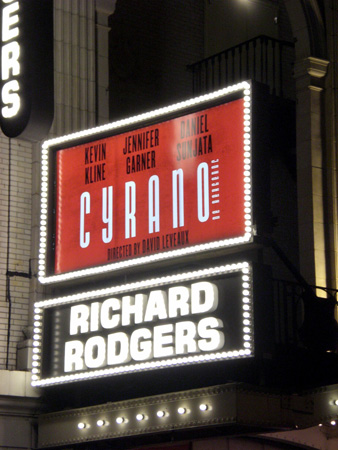

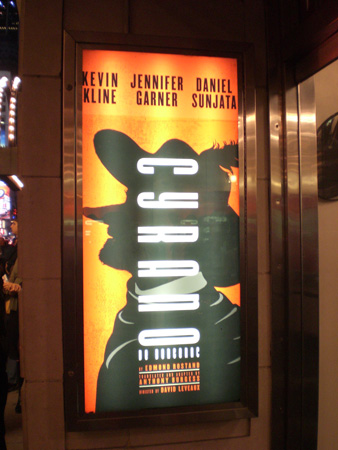

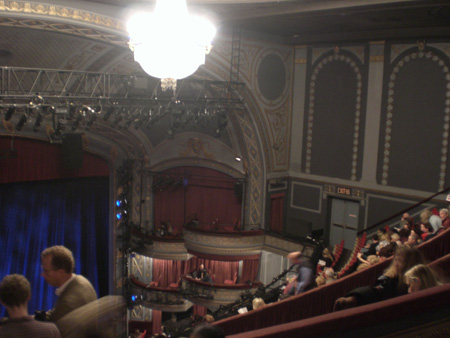

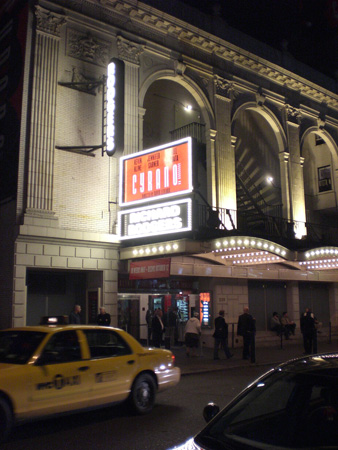

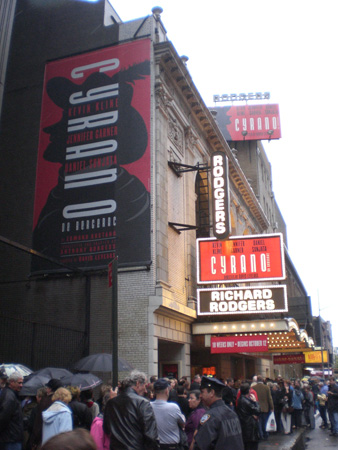

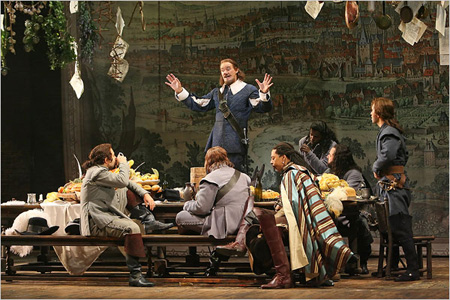

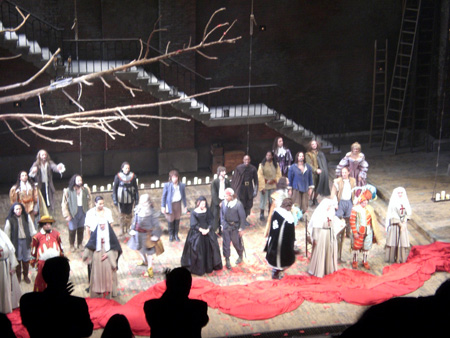





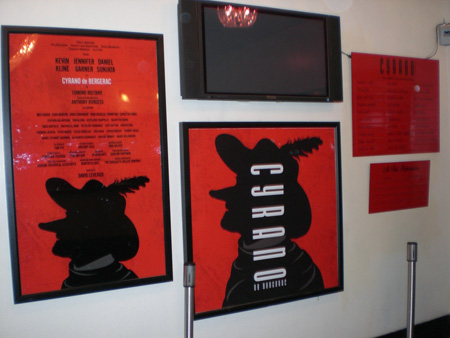

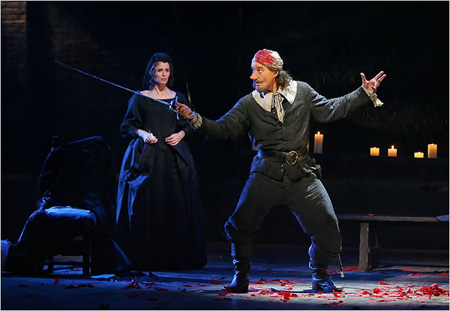

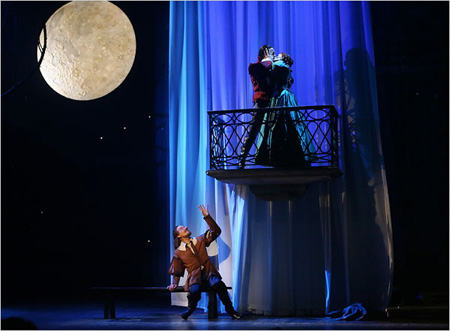

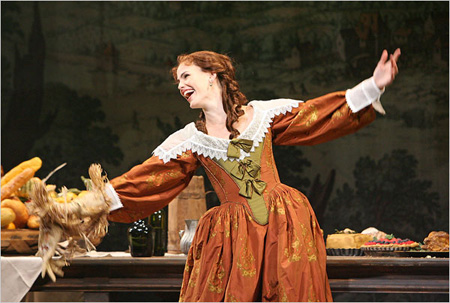

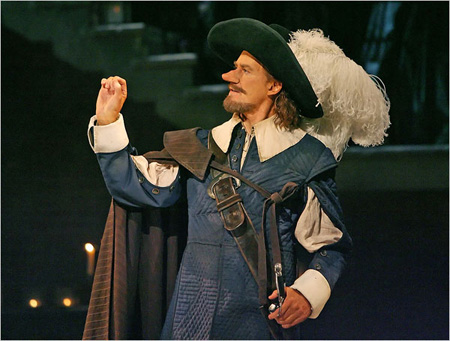

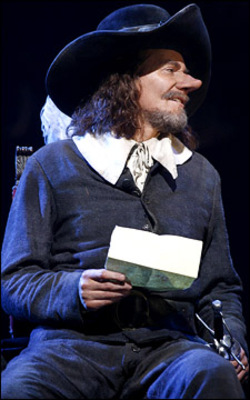

» New-York Times

» Richard Rogers Theater
Publié le 29 / 09 / 2007.

 Imprimer Imprimer
 Envoyer Envoyer
 Retour Retour
| Publicité |

|
|
|
 |





